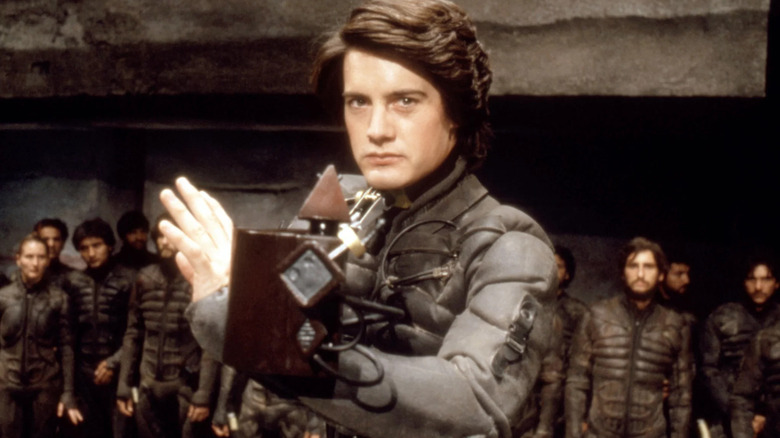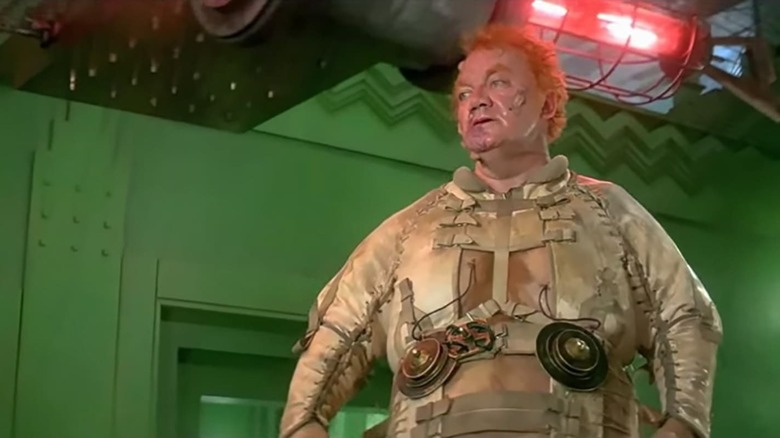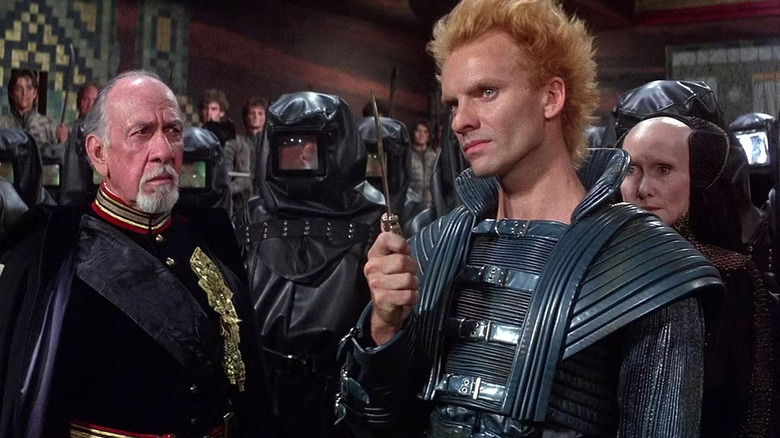How Denis Villeneuve Really Feels About David Lynch's 1984 Dune Movie
David Lynch is not very fond of his film adaptation of Frank Herbert's "Dune," feeling that it was too much a studio monster than his personal vision. After the success of "The Elephant Man" in 1980, Lynch was approached by multiple studios to handle gigantic blockbuster projects; Lynch's fans will point casual readers to an anecdote he once told about being invited by George Lucas to direct "Return of the Jedi." Learning about the franchise gave Lynch a headache, especially when he learned what a Wookiee was.
The blockbuster project Lynch accepted instead was "Dune," which he was able to make in his own preferred idiom. Even so, Lynch didn't have total creative control and felt that the whole picture was a bit of a mess. Storytelling-wise, he may be correct; a lot of information flies at the audience pretty quickly, and Frank Herbert's massively complex mythology isn't easily understood unless one watched the film a few times over. Lynch considers it the least of his films.
Despite Lynch's sentiments, his "Dune" has its share of fans, with many loving its unusual designs, strange images, and assertive grotesquerie; the villainous Baron Harkonnen (Kenneth McMillan) is covered with ooze-filled pustules, and the members of the Spacing Guild look like the Pokémon evolution of a plantar wart.
In 2021 and 2024, Denis Villeneuve adapted "Dune" to the big screen again, marking it with his own spare aesthetic, eschewing the book's mysticism in favor of its sociopolitical underpinnings. The two "Dune" movies were both hits, and the first was nominated for Best Picture at the Academy Awards.
Villeneuve shared his thoughts on Lynch's version of "Dune" in an interview with The Wrap back in February. It seems Villeneuve felt Lynch's "Dune" didn't quite nail the book in a way he appreciated.
'I was destabilized by some of his choices.'
Villeneuve clearly aimed to make his film more faithful to Herbert's novel and had to split the story between two films that equaled 321 minutes in total. Lynch, meanwhile, made a single 137-minute film and added a lot of his own ideas to the tale. In Lynch's version, for instance, the young Paul Atreides (Kyle MacLachlan) is trained in the use of Weirding Modules, special wrist-mounted weapons that amplify one's voice into concussive projectiles. Weirding Modules are not part of Herbert's original story.
When Lynch's film came out, Villeneuve was about 17 years old, and he was familiar with Herbert's work. Villeneuve was eager to see how a massive, expansive story like "Dune" could be adapted to the big screen. While visually rich, what Lynch came up with came up short. Villeneuve said:
"I was very excited when I learned that the book would be brought to the screen. I remember watching the movie and being very mesmerized and impressed by how David Lynch approached it. I was destabilized by some of his choices. David Lynch has a very strong identity as a filmmaker, of course, and it bled into the ... it's a fantastic interpretation of the book. But there were some choices that were made that was very far away from my sensibility."
Which is a fair assessment. While both filmmakers are possessed of a striking style, Lynch's films tend to bend toward the strange and the dreamlike. Villeneuve, meanwhile, has a photographer's eye, concerned more with ascetic aesthetics and visual composition than anything. One would never confuse a David Lynch film with a Denis Villeneuve film.
Villeneuve wanted to fix it
Like a true nerd, Villeneuve chose to be miffed at the bungled adaptation rather than impressed with the unique visuals. Lynch's film is indeed more in keeping with Lynch's sensibilities than anything Herbert wrote. If the internet had existed in 1984, Villeneuve would have been the type of snotty teen to post "It's a good sci-fi movie, but it's not a good 'Dune' movie." I hasten to add that snotty teens are a vital and eternal part of film discussions, and the above description is not a disparagement.
Villeneuve even thought that someone would come along someday and do the adaptation correctly. Hmm. He said:
"I remember watching the movie thinking to myself, 'Someday, someone else will do it again in the future. It will happen.' Because I didn't feel that he captured some of the essence of, specifically, the Fremen culture ... I felt that there was some things that were missing. That's the nature of adaptation, you know?"
Villeneuve couldn't have predicted that he would be the one to do it.
To offer an editorial, I prefer Lynch's version to Villeneuve's, even if Lynch's version is oblique and difficult to follow. Villeneuve's is visually distinct, and it's certainly incredibly ambitious. Villeneuve's second film especially excitingly delves into the politics of the planet Arrakis. It lacks, however, the psychedelic qualities that make "Dune" appealing. Villeneuve's "Dune" saga may continue, however, as he has, as of this writing, expressed interest in adapting Herbert's "Dune Messiah."


